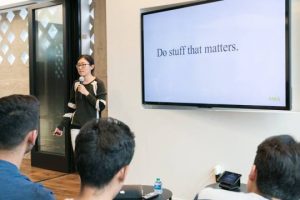Jini Kim knew something needed to change. It all started when her brother, Kimong, was diagnosed with severe autism. He often suffered from Grand mal seizures and her parents were struggling to stay ahead of the medical bills. At nine years old, Kim managed to work through the complex application process for Medicare and successfully registered her brother in the program. Since then, she has dedicated herself to making the healthcare system better.
In 2015, Kim received a call from Barak Obama: “Jini, our country desperately needs you.” At the time, she was hard at work establishing her new company Nuna. After receiving a rallying round of support from her Nuna team, she decided to tackle the challenge of working on both projects. After six months of working on healthcare.gov and her own company, the first was ready to be rolled-out to customers and the second had received financial backing from CMS, John Doerr, KPCB and many others.
Nuna, also the Japanese word for sister, is a data-driven company that specializes in the cloud-based storage of medical data; analytic applications designed to help customers better analyze their populations; and a technological platforms provider that enables outcomes-based healthcare. Kim is passionate about making healthcare affordable and accessible to everyone and Nuna is one way she is making that happen.
But that’s not the only way she is making it happen. While working on healthcare.gov, Kim was present at a call center when she heard a woman crying on the phone because she couldn’t obtain affordable health care after being diagnosed with cancer. Kim realized that the work she was doing was important and would affect millions of people accessing Medicaid services.
Since then, she has joined HealthTech4Medicaid (HT4M) to continue that work. HT4M is a nonprofit that was recently launched in November 2018. It’s dedicated to increasing the pace of innovation and technology in the Medicare system. The organization is founded on the idea of building cross-sector, collaborative relationships amongst leaders in the health technology industry. HT4M is comprised of over forty top health-tech CEOs from across the country – including Kim, herself.
“Medicaid recipients and traditionally disadvantaged populations are often overlooked by new technology,” said Leah Sparks, Co-Chair of HT4M and CEO of Wildflower Health. “Our goal is to use technology innovation to reimagine how these patients are served.” For Kim, finding something meaningful was key to her success and it seems only the sky is the limit for her future projects.























